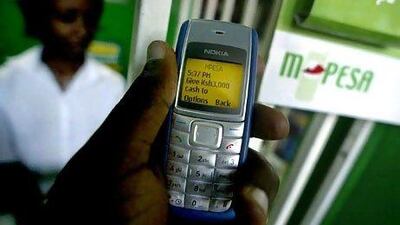There was a time when banking took place in an imposing building with marble counters and great steel vaults, in front of a banker who oversaw all of your financial affairs - even if sometimes, he did so from the tennis court or the golf course.
Tomorrow's exclusives tonight:
Industry Insights e-newsletter Stay ahead of the pack and get the pick of the premium Business content straight to your inbox. Sign up
Although the stereotyped bank manager has faded and the fortress-like branches have given way to outlets in malls and high streets, another change is under way as lenders seek to cut costs.
A revolution in mobile technology is causing banks that are cutting staff numbers to rethink whether a huge network of branches and employees is the best way to reach customers.
Banks in the Gulf, just as much as their international rivals, are looking at their branch networks to see whether they are cost-effective, says Julien Faye, the head of financial services at Bain & Company, a global management consultancy.
"A bank like Emirates NBD most probably should be thinking this way: we have a huge footprint, is that cost-effective?" he says. "Probably not, would be my intuition."
Juniper Research, a telecommunications research organisation, forecasts mobile payments for physical goods will almost triple between this year and 2015, from US$60 billion (Dh220.3bn) to $170bn worldwide.
For the world's lenders, which have announced tens of thousands of job cuts this year, that growth allows them to reduce branch operations.
Big banks are studying closely the example of M-Pesa,one of the biggest providers of banking services in Kenya, which operates without a single branch.
M-Pesa, a joint venture between Vodafone and Safaricom, allows for deposits, payments and remittances via text messages. M-Pesa sells licences to retailers and partners with affiliate banks rather than operating branches, allowing it to minimise operating costs.
Launched in 2007, M-Pesa had almost 14 million customers by last March, when it reported full-year revenues of 11.78bn Kenyan shillings (Dh464.2 million).
But a future without branches does not appeal to every bank.
Al Hilal Bank has taken the opposite tack with its mall branch on the Abu Dhabi Corniche. The 4,000 square metre flagship facility houses a crèche, an area serving women only and priority banking - alongside a coffee shop, airline desk, Etisalat kiosk and a car dealership.
But is it cost-effective? Yes, says Mohammed Zaqout, the head of retail banking at Al Hilal.
"Having a different and unique customer experience is invaluable and it justifies its cost," Mr Zaqout says. "This is translated in the customers' reaction when they first visit the branch, and come again with the full family to open accounts."
But the bank, which is fully owned by the Abu Dhabi Investment Council, has deeper pockets than many of its rivals, which allows it to splash out on branches.
For a major international lender such as HSBC, which in September said it would cut 200 jobs in the region as part of global efforts to reduce costs, mobile technology is an appealing way to make savings without losing customers.
Being able to provide banking services through a mobile phone or a tablet is becoming increasingly important for any bank to retain customers, says Francesca McDonagh, the head of retail banking for the Middle East and North Africa at HSBC. "You'd rather bank through that than going into a branch," she adds. "We need to adapt based on our customers' preferences."
For international banks, the UAE's Central Bank limits branches to one per emirate. This negates the scale advantages that a well-capitalised bank usually enjoys, meaning they have to pack more into a single branch.
Mobile technology helps to alleviate that problem, but HSBC and other banks have also established "customer service units" - typically found occupying small spaces or kiosks in shopping centres, these no-frills outlets are able to offer financial advice but not services.
"I consider those to be branches as well," Ms McDonagh says. "They're key locations for us, as well as for our customers, and we do a large part of our business through those."
Banks are seeking branches that are "smaller, more efficient and more targeted in terms of customers", Mr Faye says.
Such centres are designed to specialise in offering financial advice to customers, which they can then act on remotely using mobile apps or via a computer - also granting banks more data on customer spending habits than an infrequent meeting with a bank manager might bring.
Ms McDonagh insists that mobile technology cannot replace branches in ensuring customers feel they are being looked after.
"I always go and visit branches, because it's such an important part of our business. That's where the customer sees us in action," she says.
"There's a role for bricks-and-mortar, and the four walls of a branch will be a part of banking for the foreseeable future."
Those expatriate families that are concerned with long-term financial planning and determining savings plans for retirement or children's education are still better-served by a meeting with a personal adviser, Ms McDonagh adds, rather than an impersonal telephone conversation or the cold click of an app button.
twitter: Follow and share our breaking business news. Follow us

